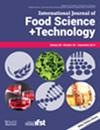Fortification of wheat white bread: assessing the suitability of Beta vulgaris trough technological, nutritional, and sensory evaluation
IF 2.6
3区 农林科学
Q2 FOOD SCIENCE & TECHNOLOGY
引用次数: 0
Abstract
SummaryAs societies undergo shifts in dietary patterns, there is often an increase in nutrition‐related issues. This is particularly evident in the case of wheat bakery products, which have evolved in an unsustainable way. The fortification of wheat flour with vegetables has emerged as a strategy to mitigate the imbalanced composition of white bread. The objective of this study is to address existing knowledge gaps regarding nutritional quality and technological characteristics of food‐to‐food fortified bakery products. A blend of小麦白面包的强化:通过技术、营养和感官评价评估蚕豆的适用性
摘要 随着社会饮食模式的转变,与营养有关的问题往往会增加。这一点在小麦烘焙产品中表现得尤为明显,因为小麦烘焙产品是以一种不可持续的方式发展起来的。在小麦粉中添加蔬菜营养强化剂已成为缓解白面包成分失衡的一种策略。本研究的目的是填补现有知识空白,了解强化烘焙食品的营养质量和技术特点。研究人员在商用小麦白面粉中掺入了贝塔粉(最多占总重量的 5%),并采用标准方法(如 AAAC、ISO)对整个面包制作过程中产生的成分和技术参数进行了分析。对测试的强化烘焙产品配方进行了感官评估。178 名自愿消费者注意到了芸苔属植物所传达的差异,但对味道和颜色的评分为可接受(9 分中的 6 分)。含有适量芥蓝的配方(如 2%)最受好评。这项研究表明,可以利用芸苔属植物来丰富白面包的营养,尤其是钙、镁和铁等矿物质的含量,而且这种方法易于操作,消费者也能接受。此外,使用混合面粉有助于减轻小麦供应波动的影响,从而提高粮食安全。
本文章由计算机程序翻译,如有差异,请以英文原文为准。
求助全文
约1分钟内获得全文
求助全文
来源期刊
CiteScore
5.80
自引率
9.10%
发文量
655
审稿时长
2.9 months
期刊介绍:
The International Journal of Food Science & Technology (IJFST) is published for the Institute of Food Science and Technology, the IFST. This authoritative and well-established journal publishes in a wide range of subjects, ranging from pure research in the various sciences associated with food to practical experiments designed to improve technical processes. Subjects covered range from raw material composition to consumer acceptance, from physical properties to food engineering practices, and from quality assurance and safety to storage, distribution, marketing and use. While the main aim of the Journal is to provide a forum for papers describing the results of original research, review articles are also welcomed.
文献相关原料
| 公司名称 | 产品信息 | 采购帮参考价格 |
|---|

 求助内容:
求助内容: 应助结果提醒方式:
应助结果提醒方式:


